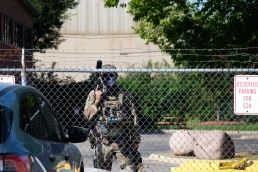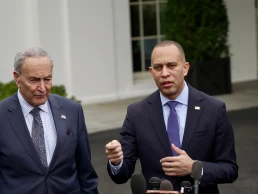Kroger and Albertsons tried to merge; union organizing stopped them. But the fight for grocery workers is just beginning.
By Sarah Lazare, In These Times
In early February, when temperatures in Denver plunged to seven degrees below zero and snow dusted the sidewalks, Martin Bonilla, bundled in two jackets and a neck warmer, walked a picket line 1,000 miles from his home of Fillmore, Calif. Bonilla works in the produce department at Vons and had flown to Colorado in the early morning after finishing an 11-and-a-half-hour shift.
Over the next eight days, Bonilla picketed five of the 77 striking Kroger-owned King Soopers stores in Colorado, in support of 10,000 members of United Food and Commercial Workers (UFCW) Local 7, putting in 16-hour shifts each day before going back to his hotel, exhausted. On the lines, he wore new boots he had bought the night before his flight and shoved hand warmers into his gloves to protect from a cold that was so piercing he went hours without texting or calling his wife, not wanting to remove his hand from his glove.

The main thing that stuck out to Bonilla, who is 53, were workers far older than he is, pushing walkers. He has worked in grocery stores for 30 years and says, “It hurt me to see people like that. They’re probably gonna be working until they die.”
“I asked them, ‘How come you’re here? You look like you’re ready to retire,’ ” Bonilla says. They told him: “We can’t afford it.”
Bonilla traveled to Denver because he is on one side of an intensifying battle — of union locals within the UFCW against these grocery behemoths that set standards across the industry.
Bonilla believes his fate as a lifelong grocery worker will be defined by the outcome. He is probably right.
Recent Posts
Judge Blocks Noem Effort to Bar Surprise ICE Jail Inspections as Detention Deaths Mount
February 4, 2026
Take Action Now A federal judge halted the DHS secretary’s renewed effort to block surprise inspections as deaths, overcrowding, and abuse…
Russia Ready to Respond to Any U.S. Weapons Deployment in Greenland: Ryabkov
February 3, 2026
Take Action Now With New START, the last nuclear treaty between Russia and US set to end, Moscow says it’s ready for more dangerous world.By News…
Trump’s Ultimatum to Cuba: Fuel or Surrender!
February 3, 2026
Take Action Now Trump’s latest executive order is an intensification of the six-decade US policy which seeks to suffocate and strangle Cuba’s economy…
As Trump Attacks the Republic, the Cowardly Democratic Party Still Won’t Fight to Win
February 2, 2026
Take Action Now With few exceptions, the Democratic Party apparatus is coasting, playing “it safe,” and expecting that the Trumpsters will deliver…




